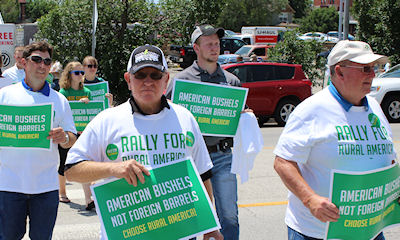
Walking to chants of "Corn not oil," corn growers, ethanol producers, and future farmers opened the doors of the Jack Reardon Center in Kansas City, Kansas, ready to show their discontent for the proposed reduction to the Renewable Fuel Standard.
Related: EPA releases 2014-16 RFS volume obligations

Rally for Rural America participants carry signs urging EPA to focus on "American bushels, not foreign barrels."
More than 250 individuals signed up to testify at the public hearing for proposed standards for 2014, 2015, 2016 and Biomass-based Diesel volume for 2017 under the Renewable Fuel Standard or the RFS. The U.S. Environmental Protection Agency heard testimony regarding its latest proposal that reduces the volume. However, more than 400 individuals traveled to the Midwest to listen to testimony and attend the nearby Rally for Rural America.
Individuals shared that under the new proposal, the EPA will be hurting farmers, workers, rural communities and the next generation by lowering the renewable fuel volumes.
Don't go back on agreement
The latest EPA proposal reduces the amount of ethanol that must be blended into America's gasoline supply in 2016. Already, the agency is proposing 16.3 billion gallons of renewable fuels, with the bulk coming from corn, to be produced in 2015, less than the 20.5 billion set by Congress. And for 2016, the agency is expecting refiners to blend just 17.4 billion gallons, well below the 22.3 billion gallon target set by Congress in 2007.
"When the RFS was signed into law, the federal government entered into a contract with the American farmer to meet the growing demand for renewable fuels," Chad Kemp, an Ohio farmer, testified. "And the American farmer lived up to the challenge and held up their end of the agreement."
Kemp, who also serves as president of the Ohio Corn and Wheat Growers Association, said that the reduction in volume feels like the EPA "pulled the rug out from under farmers."
Related: Biodiesel industry says RFS uncertainty a reason for lower 2014 production
Missouri Gov. Jay Nixon testified that the current proposal fails to meet the targets of the law. "It is just that simple," he said. "The law passed. Here are the targets. Then regulations promulgated to say part is good enough. That is not the way we play. Not in agriculture."
"The federal government made a commitment to our farmers and our farmers worked hard to meet that commitment by growing the corn to keep up with the ethanol demands," he went on to say. "Breaking that commitment hurts our families, rural economy and our environment."
Don't limit markets
Farmers are great at growing corn, Chip Bowling, president of the National Corn Growers Association and Maryland corn grower, testified. He noted that recent yields of 500 bushels per acre--nearly triple the USDA national average--begs for building new markets.
He said reduction in the RFS volumes takes the industry in the opposite direction and told the EPA to protect markets. "We simply cannot afford and will not tolerate efforts to cut demand for corn."
Protecting jobs, economic growth >>
~~~PAGE_BREAK_HERE~~~
Nixon pointed out that targets set by the RFS work as a ceiling in the market, when it should be a floor. By setting below targets, he said, the EPA caps the amount to be produced. The result is less markets for an abundant corn crop. More corn on hand drives down crop prices.
"Corn prices are now well below the cost of production," added Iowa Gov. Terry Branstad. "I was governor during the farm crisis of the 1980s; I don't want a repeat of that disaster." He said that farmers need the ethanol market to continue at levels set out by Congress in 2007. "We need the EPA to support a more robust RFS," he added. "Don't mess with the RFS."
Don't take away jobs
Randy Bryant traveled from Lyons, Kansas, to attend the EPA hearing and Rally for Rural America. He is not a farmer. Rather, Bryant works at one of Kansas ethanol plants. His concern is over the implications lowering the RFS targets will have on his job.
"If they reduce the volumes, it will not only hurt farmers, but it will hurt our production levels at the plant," he says. Ultimately, it could result in idling or closing ethanol plants. "This is a lose-lose for us."
Janine Lin flew in from California to share how the EPA proposal will jeopardize her job. Lin works with Novozymes, which is a global biotech company that serves the renewable fuel industry.
She, like Ohio farmer Kemp, told the EPA that it was "pulling the rug from under American workers, such as me whose industry will be stolen by policy." And she pleaded with the EPA to abide by the targets set out by Congress and "support American jobs."
Don't inhibit the future
Countless farmers testified that the ethanol industry made it possible to bring their sons back to the farm. Missouri farmer Kevin Hurst now has three sons that farm alongside him in the northwest town of Tarkio.
"If it hadn't been for the ethanol industry," the Missouri Corn Growers Association president said, "they would not be back farming."
Nebraska corn farmer Lynn Chrisp agrees. "In my 40 years of farming the number one game changer for rural America has been the demand created for ethanol by the RFS." He said not only did it create a new market opportunity, but also provided farm children an avenue to return to the farm.
~~~PAGE_BREAK_HERE~~~
However, the indecision by the EPA on the RFS for the past two years has already had an impact on his operation. "It is with regret that I am the one relaying the message of consequences due to the EPA action on this matter," he shared. "I would much rather the 5th generation sit here and tell you the positives of a good decision and what that means to his future in agriculture and his contributions to the environment, but will not be the case."
Chrisp's son left the farm in March. He cited risk management, weather and markets. Chrisp noted that while the farmers do not control the weather, they could purchase insurance to protect their crops. However, he noted, "farmers cannot buy insurance against the threat of a decision by the EPA and its impact on the market."
Related: USDA plans to double number of U.S. ethanol blender pumps
Chrisp implored the EPA to restore renewable volume obligations back to the 2007 levels for the future of American agriculture's next generation. "The damage to our farm cannot be undone but the better future still remains possible if we return to the levels passed by Congress."
And the future of agriculture was present at the hearing and Rally for Rural America. Missouri FFA member Abby Bertz from the Odessa FFA Chapter testified on the need to increase RFS volumes to bring not only sons, but also daughters home to the farm. While Norborne FFA Chapter member Logan Korff, spoke at the rally of how ethanol provided "jobs and much needed economic development," to his small town.
The witnesses will know by the end of November whether their evidence and opinions changed the EPA's proposal, as the agency will review the comments and issue its final standards.
About the Author(s)
You May Also Like






